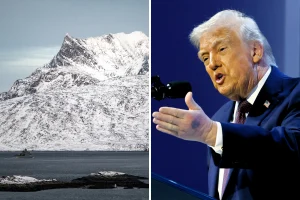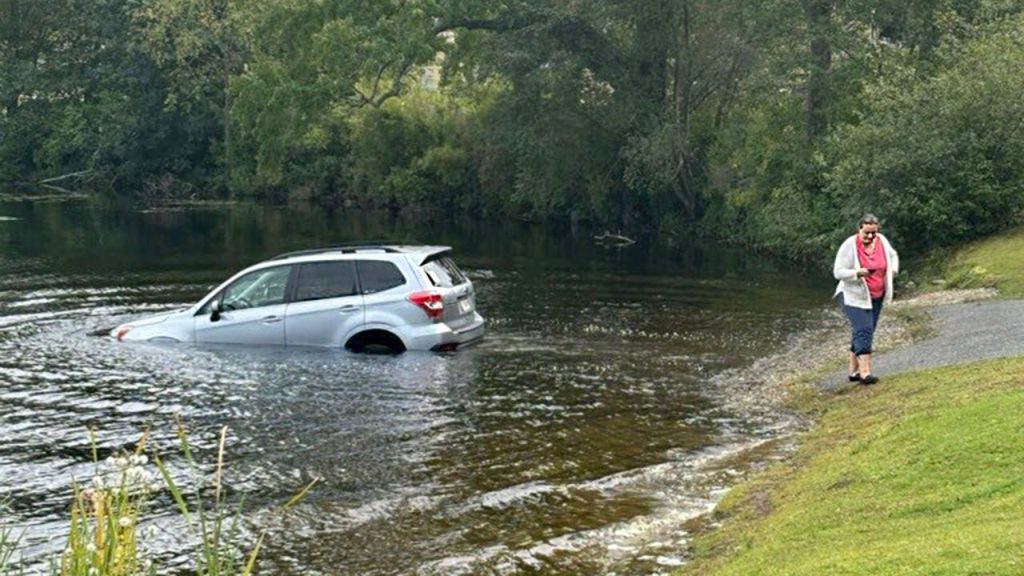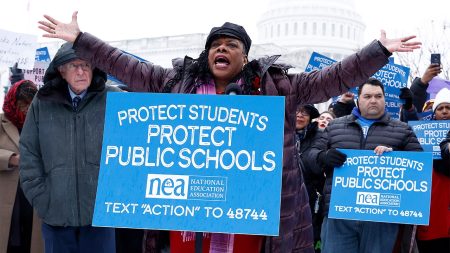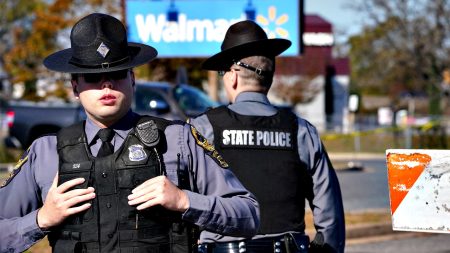Anti-ICE Protester’s Car Rolls into Lake During Demonstration
In a peculiar turn of events in the small town of Upton, Massachusetts, an anti-ICE (Immigration and Customs Enforcement) protester experienced an unfortunate mishap while demonstrating against immigration authorities. The incident, which occurred approximately 40 miles west of Boston in Worcester County, involved a protester who, in her haste to confront ICE agents making an arrest, apparently forgot to secure her vehicle. According to sources from Immigration and Customs Enforcement, the woman left her car without putting it in park while she rushed to voice her opposition to the ongoing arrest of an undocumented immigrant. The unattended vehicle subsequently rolled into a nearby lake and sank, creating an unexpected spectacle amidst the already tense situation.
The incident was captured on video footage provided to Fox News by an ICE source, documenting both the confrontation and the aftermath of the automobile’s watery descent. In the recorded clip, a voice can be heard commenting on the situation with a note of irony: “Well that sucks. Look at that Lucy. Her car got lost,” as the vehicle drifted further into the water and gradually submerged. The video also shows what appears to be an ICE officer walking past the camera with a person in handcuffs, presumably the individual whose arrest sparked the protest in the first place. This juxtaposition of the intended protest and the unintended consequence creates a striking visual narrative about the day’s events.
This incident takes place against a backdrop of ongoing tension between immigration enforcement authorities and those who oppose their policies and practices. Upton, despite its small-town status, has apparently been a site of consistent demonstration activity in recent weeks. Protesters have maintained a presence in the area, voicing opposition to ICE operations and the agency’s enforcement of immigration laws. These demonstrations reflect the broader national debate surrounding immigration policy, enforcement practices, and the treatment of undocumented immigrants—issues that continue to deeply divide American public opinion and political discourse.
The Upton incident illustrates the sometimes unpredictable nature of protest activities and the personal costs that can accompany activism. While no injuries were reported in connection with the submerged vehicle, the protester faced not only the financial loss of her car but also the embarrassment of having her mishap documented and subsequently shared with media outlets. This personal setback occurred while she was engaged in what she presumably considered an important act of political expression and solidarity with immigrants facing detention or deportation. The irony of the situation—losing one’s property while protesting the actions of authorities—adds a complex layer to the narrative about civic engagement and the risks inherent in public demonstration.
This event occurs within the larger context of immigration enforcement actions that have been controversial throughout the country. ICE operations, particularly those involving arrests and deportations, have frequently drawn protesters who object to what they view as overly aggressive or inhumane treatment of immigrant populations. Similar demonstrations have occurred in numerous cities across the United States, sometimes with more serious confrontations between protesters and authorities. The reference in the article to “anti-ICE Portland rioters with guillotine” suggests that in some locations, these protests have escalated to include more aggressive tactics and symbolic displays of opposition to immigration enforcement.
As immigration continues to be a contentious policy issue in American politics, incidents like the one in Upton illuminate the personal dimensions of political activism and the sometimes unexpected consequences that can emerge from heated moments of confrontation. The submerged car serves as an unusual footnote in the ongoing national conversation about immigration enforcement, border security, and the treatment of undocumented immigrants in the United States. While individuals on both sides of the issue maintain strong convictions about the proper approach to immigration policy, this incident reminds us of the human elements—including moments of misfortune and unintended comedy—that can emerge even in serious political contexts. As demonstrations continue in Upton and elsewhere, participants will likely be more mindful of securing their vehicles before engaging in acts of protest.







